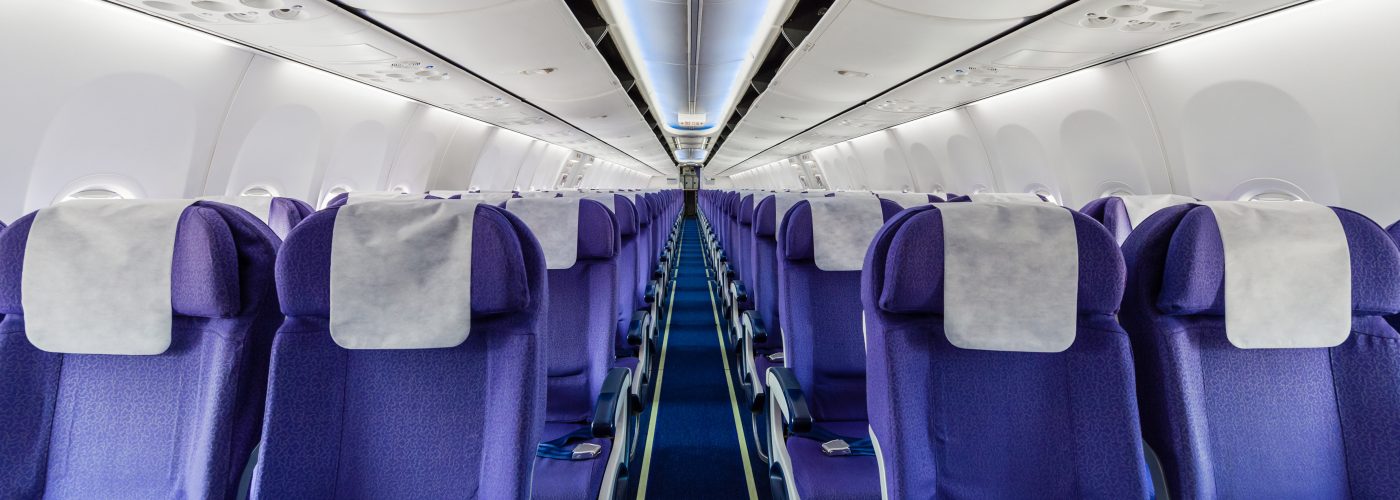As airlines continue to cram more and more people into each plane, the flying experience gets less comfortable for all passengers—especially as the traveling public grows increasingly overweight. But is there a point when someone is considered too fat to fly? Most carriers now have some sort of policy in place to prevent obese travelers from infringing on the personal space of the passengers next to them.
Airline obesity policies differ in degree and detail, but decree essentially that if you don’t fit into a seat with an extension seatbelt and the armrests down, you will be charged for two seats or removed from the plane.
Most airlines recommend that if you think you will be too large for your seat, you should purchase a second seat at the time you make your original booking (or, of course, buy a ticket in first or business class). Some airlines will offer a discount on the second seat or refund the cost if the plane isn’t full, but in many cases obese passengers simply have to pay twice the price as other flyers.
Are Airline Obesity Policies Fair?
Obesity is a hot-button topic, and many will argue that some big folks simply need to pare back on the super-size fries. But what about passengers who have serious health issues that cause them to gain weight?
On a broader level, is it fair or logical for the airlines to keep shrinking airplane seats even though nearly 40 percent of American adults are now obese? This makes things awkward for everyone—including the large passengers themselves. (See the moving essay What it’s like to be that fat person sitting next to you on the plane.)
Airline obesity policies bring up some sensitive issues. Who decides if someone fits in the seat, and when do they decide? Is the decision left up to a flight attendant after the entire plane has boarded? Is it somebody at the gate? At check-in? Will there someday be a BMI (Body Mass Index) field on booking sites? Might we eventually have to sit in a test seat, much like the metal cages that measure the size of your carry-on bag?
Over the years, some of these questions have moved out of the realm of the rhetorical—though there have been very few cases where the airlines’ policies have been tested or disputed in public (not surprisingly, due to the very sensitive nature of the issue). Most overweight travelers have simply taken the abuse, or made their case without going too public.
There is a simple solution, of course: wider seats on planes. In the same way that airlines offer “economy plus” sections with more legroom, they could have rows that have fewer and wider seats. (There’s always the option of business class in this case, but airlines could do the same thing in economy class, just without the free booze, dedicated loo, and big upcharges.)
The airlines argue it would be too costly to retrofit planes to include larger seats—so for now, the traveling public is stuck with the status quo. Below is a run-down of obesity policies on several major airlines in the U.S. and abroad.
Alaska Airlines’ Customers of Size Policy
Alaska Airlines requires the purchase of a second seat for any passenger who can’t “comfortably fit within one seat with the armrests in the down position.” If you purchase a second seat in advance, and your flights all take off with at least one seat available, you can get a refund for the cost of the second seat. For those who haven’t purchased a second seat in advance, you may do so the day of your flight; if two seats aren’t available together, you might need to take a later flight.
Allegiant’s Passenger of Size Policy
Allegiant recommends that passengers who are unable to lower their armrest purchase a second ticket at the time of booking. If the passenger waits until the day of travel to request a second seat, “the agent will be unable to sell a second ticket unless two seats are available side-by-side,” says the airline website. If an extra seat is unavailable, the passenger will not be able to fly.
American Airlines’ Extra Space Policy
American requires passengers to purchase a second seat if they need a seatbelt extension and their body “extends more than 1 inch beyond the outermost edge of the armrest.” The airline recommends that you buy both seats during your original booking (at the same rate). If you don’t book two seats in advance, you will be responsible for any fare difference on a second seat purchased the day of your flight. If the airline can’t accommodate you on your scheduled flight, the airline will let you purchase two seats on a later flight for the same price as your original seats.
Delta Airlines’ Extra Seat Space Policy
Delta recommends but does not require that obese passengers book an additional seat. “For customers who need extra space outside the standard Economy Seat—which features 31-32” of legroom with a 17.2” width—you can ask to be reseated next to an empty seat or pay to upgrade to First/Business class,” the airline says on its website. The airline will provide seatbelt extensions if necessary, but does not permit flyers to bring their own.
Frontier’s Customer of Size Policy
Frontier requires that customers who are unable to lower both armrests purchase a second seat “prior to travel.”
Hawaiian Airlines’ Policy for Flyers Needing Additional Room
Hawaiian recommends that flyers who can’t sit comfortably with both armrests lowered call in advance to reserve a second seat. If you don’t do this, the airline “will try to find a suitable alternative,” but if this isn’t possible, you may not be able to fly on your originally scheduled flight.
JetBlue’s Customer of Size Policy
I was unable to find an official policy on JetBlue’s website, and the airline did not respond to a request for comment.
Southwest Airlines’ Customer of Size Policy
Southwest encourages obese passengers to purchase an extra seat in advance to guarantee that sufficient space will be available on their flight; the airline promises to refund all extra seat purchases, even if the flight is oversold. Passengers can also wait until the day of their flight to speak with a customer service person at the gate, who will give them a complimentary additional seat if it’s available.
Spirit Airlines’ Extra Seat Policy
Spirit requires that any passenger who “encroaches on an adjacent seat area and/or is unable to sit in a single seat with the armrests lowered” purchase an additional seat. Travelers who need a seatbelt extension are not eligible to sit in a seat with an inflatable seatbelt.
United Airlines’ Extra Seating Policy
If you can’t buckle your seatbelt (with an extension if necessary) and fit into a seat with the armrests down—without encroaching “significantly” on the adjacent space—you must purchase an additional seat or pay for an upgrade to a roomier seat on United. The carrier recommends buying two seats at the time of booking, at which time you’ll pay the same fare for the second seat; if you wait until the day of travel, you’ll pay the fare available that day. If no additional seats or upgrades are available, you’ll have to rebook on the next flight with availability. (United will, however, waive the change fees.)
Airline Obesity Policies Outside the U.S.
There are too many airlines around the world to enumerate every single policy, but below is a sampling.
In Canada, obesity is considered equivalent to other disabilities when it comes to extra seats on a plane under the country’s One Person One Fare program. Says the Air Canada website, “Extra seating is available free of charge for travel within Canada, to customers who require extra seating because they are disabled by obesity or because they must accommodate another disability.” (A physician’s approval is required.) For flights to destinations outside of Canada, you might have to purchase an additional seat.
In Europe, Air France offers a 25 percent discount on your second seat if purchased in advance, with a full refund if there are unoccupied seats on your flight. If your flight is full, you haven’t booked an additional seat, and you can’t fit comfortably into a single seat, you may not be permitted to board. Meanwhile, British Airways requires passengers to be able to fully lower both armrests; if you can’t fit into the seat under these conditions, you must purchase an extra seat.
In the Southern Hemisphere, Qantas and LATAM encourage travelers needing extra space to call and book an additional seat.
Looking for a carrier not listed above? Airline obesity policies are often difficult to find on carriers’ websites. Sometimes you can pull them up by searching “extra seat” or “customer of size,” but the best strategy is to call the customer service number—if you need to purchase an extra seat, you’ll likely end up calling the airline anyway.
Do you think the airlines’ policies are fair to all passengers?
More from SmarterTravel:
- 9 Tips for Savvy Plus-Size Travelers
- The Worst Seats on a Plane (and How to Avoid Them)
- The Best Plus-Size Travel Clothes to Flatter Any Body
Editor’s note: This story was originally published in 2017. It has been updated to reflect the most current information. Sarah Schlichter contributed to this article.
We hand-pick everything we recommend and select items through testing and reviews. Some products are sent to us free of charge with no incentive to offer a favorable review. We offer our unbiased opinions and do not accept compensation to review products. All items are in stock and prices are accurate at the time of publication. If you buy something through our links, we may earn a commission.
Related
Top Fares From
Today's Top Travel Deals
Brought to you by ShermansTravel
Shop and Save with Country Inns...
Patricia Magaña
 Hotel & Lodging Deals
Hotel & Lodging Deals
$229 -- Chicago: Discounted Rates and...
Francesca Miele
 Hotel & Lodging Deals
$229+
Hotel & Lodging Deals
$229+
$188 -- Honolulu: Save on Oceanview...
Abigail Lamay
 Hotel & Lodging Deals
$188+
Hotel & Lodging Deals
$188+




